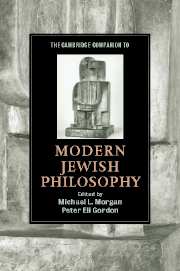Book contents
- Frontmatter
- 1 Introduction: Modern Jewish Philosophy, Modern Philosophy, and Modern Judaism
- 2 Baruch Spinoza and the Naturalization of Judaism
- 3 The Liberalism of Moses Mendelssohn
- 4 Jewish Philosophy after Kant The Legacy of Salomon Maimon
- 5 Hermann Cohen: Judaism and Critical Idealism
- 6 Self, Other, Text, God: The Dialogical Thought of Martin Buber
- 7 Franz Rosenzweig and the Philosophy of Jewish Existence
- 8 Leo Strauss and Modern Jewish Thought
- 9 Messianism and Modern Jewish Philosophy
- 10 Ethics, Authority, and Autonomy
- 11 Joseph Soloveitchik and Halakhic Man
- 12 Emmanuel Levinas: Judaism and the Primacy of the Ethical
- 13 Emil Fackenheim, the Holocaust, and Philosophy
- 14 Evil, Suffering, and the Holocaust
- 15 Revelation, Language, and Commentary: From Buber to Derrida
- 16 Feminism and Modern Jewish Philosophy
- Bibliography
- Index
15 - Revelation, Language, and Commentary: From Buber to Derrida
Published online by Cambridge University Press: 28 September 2007
- Frontmatter
- 1 Introduction: Modern Jewish Philosophy, Modern Philosophy, and Modern Judaism
- 2 Baruch Spinoza and the Naturalization of Judaism
- 3 The Liberalism of Moses Mendelssohn
- 4 Jewish Philosophy after Kant The Legacy of Salomon Maimon
- 5 Hermann Cohen: Judaism and Critical Idealism
- 6 Self, Other, Text, God: The Dialogical Thought of Martin Buber
- 7 Franz Rosenzweig and the Philosophy of Jewish Existence
- 8 Leo Strauss and Modern Jewish Thought
- 9 Messianism and Modern Jewish Philosophy
- 10 Ethics, Authority, and Autonomy
- 11 Joseph Soloveitchik and Halakhic Man
- 12 Emmanuel Levinas: Judaism and the Primacy of the Ethical
- 13 Emil Fackenheim, the Holocaust, and Philosophy
- 14 Evil, Suffering, and the Holocaust
- 15 Revelation, Language, and Commentary: From Buber to Derrida
- 16 Feminism and Modern Jewish Philosophy
- Bibliography
- Index
Summary
The turn to language in twentieth-century philosophy is well known. Despite the profound methodological differences and ultimate philosophical disagreements between them, many if not most Anglo-American and Continental-European philosophers continue to emphasize philosophical reason’s intimate relation to, if not dependence on, language. But there is of course an enormous difference between the more minimalist thesis that reason is expressed in language and the more maximalist statement that reason depends on language. This difference goes to the heart of the question of what “philosophy” actually is and does. Can and should philosophy stand above our particular language games and articulate some deeper truth behind the cultural and historical contexts in which all human life is embedded? And what are the scientific, ethical, and indeed the theological implications of how we might answer this question?
While suggesting that these questions are philosophically and historically tied to modern philosophical discussions about the relations between reason and revelation, this chapter explores twentieth-century Jewish philosophical approaches to language. For a number of Jewish philosophers, the turn to language is a turn away from the historically implicit Christian assumptions of much of Western philosophy. As many have observed, the linguistic turn brought philosophy much closer to some of the central concerns of the Jewish historical tradition, and Jewish thinkers were quick to pursue their work in this new area of overlap. To appreciate these Jewish philosophical arguments, and their similarities to and differences from each other as well as to twentieth-century philosophies of language generally, this chapter has been laid out in four parts. Part I describes briefly how the linguistic turn in philosophy redefines the notions of both “philosophy” and “revelation.”
- Type
- Chapter
- Information
- The Cambridge Companion to Modern Jewish Philosophy , pp. 300 - 323Publisher: Cambridge University PressPrint publication year: 2007

